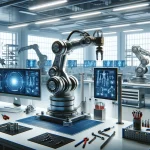Masayoshi Son, founder and CEO of SoftBank, has confidently projected that artificial super intelligence (ASI) could emerge in the next decade. Speaking at SoftBank’s annual meeting in Tokyo, Son emphasized a future where AI might exceed human cognitive capabilities, radically altering the world. His prediction posits that by 2030, AI will be significantly more intelligent than humans, and by 2035, it may become vastly superior. For more on Son’s vision, visit the SoftBank website.
AI to Surpass Human Genius
During the meeting, Son delineated the difference between artificial general intelligence (AGI) and ASI. AGI, he explained, could function as a human “genius,” outperforming an average person by up to ten times. ASI, on the other hand, would operate on a much higher level, potentially being 10,000 times more capable than human intelligence.
Safety and Capability in AI Development
Son’s predictions coincide with the mission of Safe Superintelligence Inc. (SSI), a startup founded by Ilya Sutskever, Daniel Levy, and Daniel Gross. SSI aims to address safety and capability advancements in AI as interlinked challenges, aspiring for technological breakthroughs to ensure safe progression towards superintelligence. The founders of SSI emphasize the need to advance capabilities rapidly while maintaining a priority on safety.
The scientific community remains divided on the feasibility of AGI and ASI. Current AI systems excel mainly in specific tasks but fall short of human-level general reasoning. Despite this, SoftBank’s focus on ASI development, mirrored by SSI’s safety-oriented approach, underscores the tech industry’s growing interest in superintelligent AI.
Son’s address took a personal turn as he linked ASI development to his life’s purpose and SoftBank’s founding mission. He expressed a profound commitment to realizing ASI, underscoring the significance he places on this technological pursuit.
The implications of ASI’s potential emergence include job displacement, ethical dilemmas, and risks from creating an intelligence that vastly outstrips human abilities. The tech industry’s race toward developing superintelligent AI highlights the urgency and competitive nature of these advancements.
Comparative analysis shows differing perspectives on AI development timelines. While some experts express skepticism about achieving ASI within a decade, others are more optimistic about rapid advancements. These varying viewpoints reflect the ongoing debate about the pace and plausibility of such transformative AI developments.
Past discussions around AI have often focused on incremental improvements rather than the leap towards superintelligence. The current discourse, driven by influential figures like Son and innovative startups like SSI, indicates a shift towards more ambitious goals, even as the feasibility of these aspirations remains uncertain.
Analyzing Son’s optimistic projections with previous AI achievements showcases the dynamic nature of AI research and its rapidly evolving goals. While the promise of ASI is compelling, the road to achieving it involves navigating complex technical, ethical, and safety challenges.
As the tech industry pushes towards superintelligent AI, understanding the broader implications becomes crucial. Stakeholders must consider the potential socioeconomic impacts, ethical considerations, and safety measures. The intertwined pursuits of capability and safety, as highlighted by SSI, offer a balanced perspective on advancing AI responsibly.










